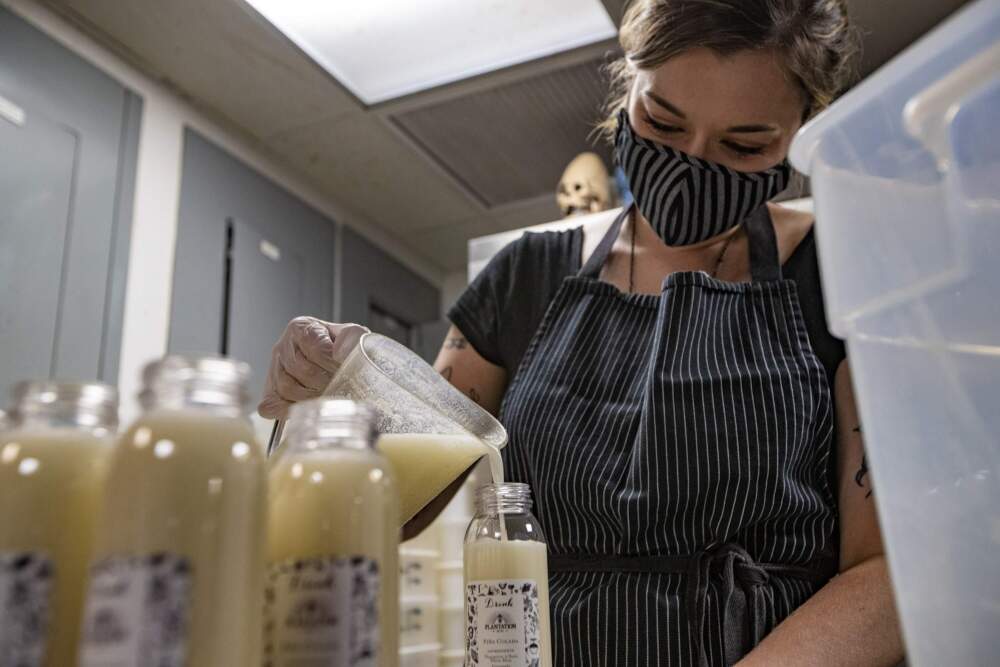Advertisement
Boston's Morning Newsletter
Will Mass. let restaurants sell to-go alcohol permanently? A deadline to decide is nearing

Editor's Note: This is an excerpt from WBUR's daily morning newsletter, WBUR Today. If you like what you read and want it in your inbox, sign up here.
If tomorrow is Super Tuesday, what does that make today? Super Monday? (Is a super Monday even possible? I’d settle for tolerable.)
Let’s get to the news:
The future of alcoholic to-go drinks in Massachusetts could be decided this month. The pandemic-era rule allowing local restaurants to sell takeout alcohol with food orders is once again set to expire on April 1, following repeated extensions. However, a wide-ranging municipal aid bill proposed by Gov. Maura Healey would make the policy permanent. And with the clock winding down, lawmakers are feeling pressure from both sides.
- The case for it: The Massachusetts Restaurant Association’s Jessica Muradian told WBUR’s Sam Coetzee that to-go drinks have proven to be “extremely popular” with guests and “does add a little bit to the bottom line” for restaurants. She also noted restaurants have invested in the practice. “There’s costs behind buying the packaging that you need to properly sell a cocktail to go, right?” Muradian said. “And those folks really want to continue a practice that they’ve been allowed to do.”
- The case against it: Rob Mellion, the head of the state’s Package Stores Association, told Sam that restaurants are not as tightly policed as liquor stores, making it much easier for those under 21 to get their hands on alcohol. Mellion also said to-go drinks are being pushed by “big alcohol” at the national level as a vehicle “ultimately to secure direct-to-consumer shipping” of booze to people’s homes, as small liquor stores continue to struggle.
- Zoom out: NPR reported in 2022 that 17 states have moved to permanently allow to-go drinks since the pandemic.
- Go deeper: Muradian stresses there have been no reports by the state’s Alcoholic Beverages Control Commission of restaurants selling to-go alcohol to minors under the policy. However, a small-scale study in 2022 found that order recipients’ IDs were not checked around half the time.
Advertisement
Yes, tomorrow is a big day in national politics. WBUR’s Anthony Brooks reports Republican presidential candidate Nikki Haley spent the weekend campaigning around New England — which holds three of tomorrow’s 17 Super Tuesday primaries — as she tries to make a stand against former President Donald Trump. That includes Massachusetts, where Haley rallied supporters in Needham.
- What she’s saying: Haley chided Trump for his recent comments encouraging Russia to attack NATO countries that he thinks spend too little on their militaries. “That means he’s actually going to side with a dictator who kills his political opponents,” she said.
- Zoom out: Haley also got her first 2024 victory yesterday, winning the District of Columbia’s primary and all 19 of its delegates. However, Trump still widened his lead, picking up 83 delegates over the weekend from Idaho and Missouri’s caucuses.
- Zoom in: While this may not be the most competitive presidential primary in recent memory, Massachusetts voter advocates are working to persuade people it’s still important to participate.
Fifteen electric school buses are on their way to Worcester, thanks to a nearly $6 million federal grant. WBUR’s Paul Connearney reports the rollout is expected in 2026. (In the meantime, the city will install charging stations and other infrastructure to support the initiative, as well as apply for additional grants to get more buses.)
- The big picture: The wave of federal funds have helped school districts across Massachusetts add electric buses to their fleets. WBUR’s Carrie Jung reported last year that five districts qualified for the first round of grants, which is expected to bring a total 76 new electric buses to the roads this year. Meanwhile, Boston has used COVID relief money to roll out 20 electric school buses.
Pedaling to P-town: Provincetown officials are asking residents — and even visitors — for feedback on a proposal to build a multi-use bike path along Route 6 to the Truro town line. Several concepts are under consideration (including converting the Old Colony Nature Trail into a paved multi-use path) as part of a larger effort to expand the Outer Cape’s bike and pedestrian network. Town Planner Thadeus Soule told WBUR’s Steve Chapman the proposal would also make it easier for people to bike to nearby attractions, like Nickerson State Park and Marconi Beach.
- Weigh in: You can take the online survey here. A public forum is also scheduled for March 18 at the Provincetown Town Hall.
P.S.— Boston Mayor Michelle Wu will be on Radio Boston today at 11 a.m., which means you have about three hours to send in your questions. Send them by joining the coolest club on this side of the Charles River: The Radio Boston text club!
